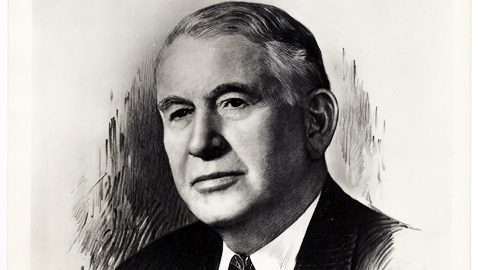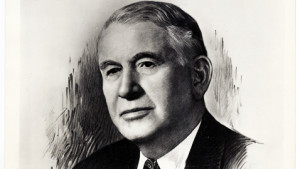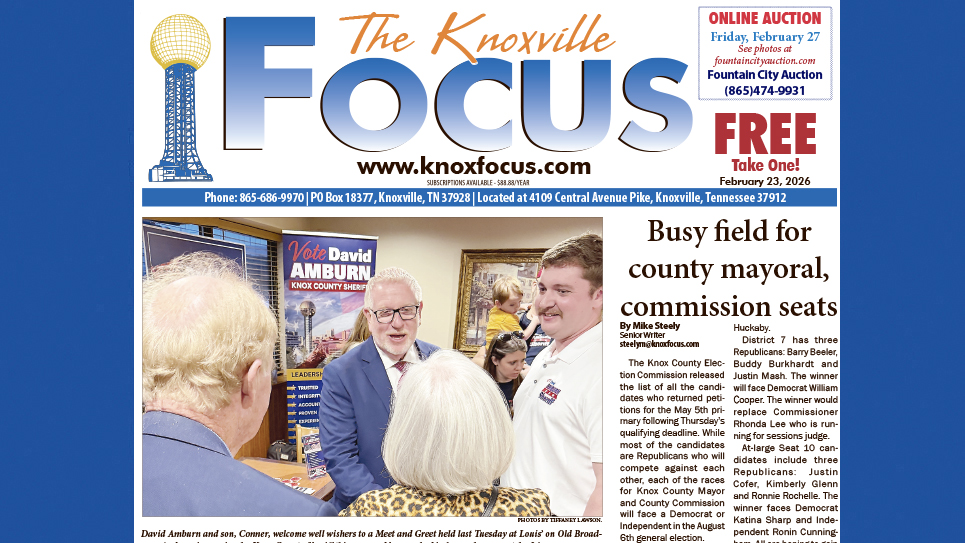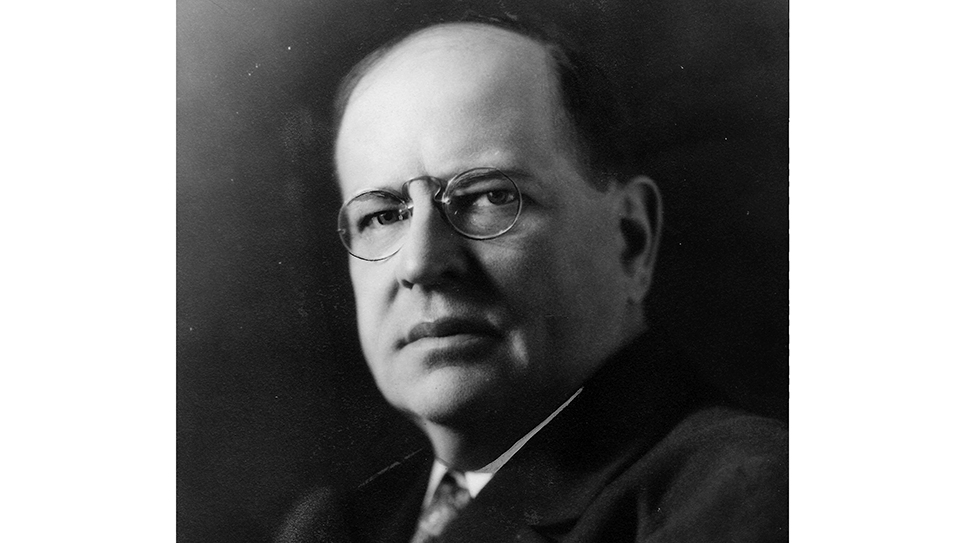During his time, Alben W. Barkley was one of the most famous public officials in the country. Barkley was renowned for his oratory and could be depended upon to give a rousing speech just about anywhere, at any time and on most any topic.
Barkley was the son of tenant farmers, born November 24, 1877 and is one of the few politicians in a modern age who truly could claim he really was born in a log cabin. Barkley’s initial path to success was a hard one and he worked as a janitor to put himself through Marvin College. Barkley went on to Emory, where he graduated in 1900. The young lawyer found time to get married and start a family. Dorothy and Alben Barkley had three children and the two would remain married until Dorothy’s death in 1947.
Barkley took his law degree to Paducah, Kentucky and commenced the practice of his profession and by 1905, he was the prosecuting attorney for McCracken County. Alben Barkley then became County Judge and when a Congressional seat opened up in 1912, he ran and won.
Barkley entered Congress as the Democrats took back the White House with Woodrow Wilson and Barkley’s record reflected concern and support for farmers and rural interests. Alben Barkley competed for the Democratic gubernatorial nomination in 1923, but barely lost the primary, his only defeat in a Kentucky election. Barkley’s failure to win the nomination for governor gave him needed name recognition when he sought to defeat incumbent Republican U. S. Senator Richard Ernst in 1926.
Alben Barkley campaigned at a frenetic pace, frequently giving as many as sixteen speeches per day, shaking every available hand, attending barbecues and fish fries. Barkley soon won the sobriquet of “Iron Man” for his indefatigable style of campaigning.
Barkley’s ability to bring a crowd to its feet was well utilized by his own party and he gave the keynote speech at the 1932 Democratic National Convention. Senator Barkley was easily reelected to the Senate that year and he was a devoted supported of newly elected President Franklin Delano Roosevelt and the New Deal administration. Barkley became the assistant Majority Leader in the Senate under Arkansas Senator Joseph T. Robinson. Where Robinson could be a bully, possessed a volatile temper, and was not above trying to browbeat fellow senators into submission, Barkley was far more amiable. Barkley tried to convince his colleagues through gentle persuasion, conciliation, and had a seemingly bottomless well of amusing stories to cajole recalcitrant senators.
In 1937, President Roosevelt, angry with the U. S. Supreme Court having struck down several New Deal measures, proposed the most controversial piece of legislation during his long presidency; FDR asked the Congress to enlarge the Supreme Court membership. Majority Leader Joe Robinson had been promised the first new seat on the Supreme Court and he toiled relentlessly to pass a measure that was anathema to many inside his own party. The stress proved to be too much for Robinson who was found dead in his apartment by his maid, the victim of a heart attack.
The contest to succeed the late Joe Robinson was a hard fought battle between Barkley and Mississippi Senator Pat Harrison. While Harrison was considered by many of his colleagues to be a bit lazy, he was well liked and considered more conservative than the Kentuckian. The Democrats had a huge majority in the Senate at the time and every vote would count. FDR could not resist the temptation to interfere in a race that was purely an internal matter for Senate Democrats as to which man they preferred as their own Leader. The Roosevelt administration brought pressure to bear on individual senators to support Barkley, who was seen as the more friendly to the New Deal. Senator Harry Truman of Missouri, a product of the Pendergast machine in Kansas City, heard directly from Boss Tom Pendergast, who asked Truman to vote for Barkley. Truman refused, showing his ballot for Harrison to another senator. The dislike between Pat Harrison and his colleague, Theodore Bilbo, cost him the election. Bilbo had tried to unseat Harrison in the 1936 Democratic primary and relations between the two were anything but cordial. An emissary was sent to Bilbo who replied he would indeed vote for Harrison if Pat would ask him personally. When told of Bilbo’s pledge, Pat Harrison pondered it for a moment before barking, “You tell that son-of-a-bitch I wouldn’t speak to him if it meant the presidency of the United States!” Barkley won the Majority Leader’s position 38-37. In his memoirs, Barkley related the tension in the Senate Caucus Room was such that he bit the stem of his pipe in two.
Alben Barkley did not have an easy time as Majority Leader; his fellow Democrats were a fractious lot and ranged in philosophy from the ultra liberal to the ultra conservative. Senator Barkley also faced a formidable political challenge at home when popular Governor Albert B. “Happy” Chandler ran against him in the 1938 primary. Once again, FDR did all he could to make it clear he favored Barkley, but the irrepressible Happy Chandler gave the veteran senator a scare. Barkley won the primary and would later tell a story illustrating the fickle nature of voters that would become famous. Senator Barkley was astonished to learn that a particular farmer was supporting Chandler; Barkley went to see the old gentleman who confirmed the rumor was true. Barkley was shocked and proceeded to list all the numerous favors he had done for the man, which the farmer acknowledged. Barkley pointed out the jobs he had secured for the farmer’s son, daughter-in-law and several other family members and was aghast when the old fellow drawled, “Yes, but what have you done for me lately?”
One of Barkley’s best friends in the United States Senate was Tennessee’s Senator Kenneth McKellar. The two had gone to Congress around the same time and although McKellar got to the Senate ten years before Barkley, they remained very good friends. When Majority Leader Barkley, frustrated with a filibuster by Southern senators, instructed the Senate’s Sergeant At Arms to arrest absent senators, including the temperamental McKellar. Senator McKellar was not surprisingly furious at having been arrested and refused to speak to Barkley for almost nine months, in spite of the fact they sat beside one another on the Senate floor. Barkley was genuinely depressed by McKellar’s anger and when FDR vetoed a tax bill the Kentuckian had moved heaven and earth to pass for the administration, the usually mild mannered Barkley exploded. He bitterly denounced FDR and the president’s veto while defending the Congress’s actions before dramatically resigning as Majority Leader. The Democratic caucus promptly convened and reelected Barkley unanimously. A bewildered FDR muttered that Alben Barkley must have come unhinged and Roosevelt’s displeasure with Barkley likely cost the Kentuckian the vice presidency in 1944 when Roosevelt replaced Henry Wallace as his running mate with Harry Truman.
Alben Barkley had desperately wanted to be Vice President, yet it was the little man from Missouri who finally gave him the opportunity. Barkley had again been the keynote speaker at the Democratic National Convention in 1936 and was again asked to perform the same chore in 1948. Democrats were dispirited and depressed about Truman’s ability to defeat New York Governor Thomas E. Dewey. Barkley gave a fighting speech that once again brought delegates to their feet and for the first time managed to give hope to discouraged Democrats. Truman, like FDR before him, had strongly considered Supreme Court Justice William O. Douglas for the vice presidency, a curious choice considering Douglas had never been elected to anything and had no visible following. Barkley’s speech had so electrified delegates, many urged Truman to pick the seventy-year old Kentuckian. Barkley himself grumped that Truman needed to ask him quickly, before the nomination was “passed around like a cold biscuit.”
Truman and Barkley surprised just about everybody by winning the election in 1948 and Alben W. Barkley finally realized his cherished dream to become Vice President of the United States. Barkley was the first Vice President to be referred to as “The Veep”, a title suggested by Barkley’s young grandson. Barkley also remarried while serving as Vice President. His first wife had died in 1947 after a long illness that had forced Barkley to travel across the country making paid speeches to pay mounting medical bills.
The romance between the seventy-one year old Vice President and the thirty-seven year old comely widow Jane Hadley drew considerable attention from the news media at the time. When Truman declined to seek reelection in 1952, Barkley announced his own candidacy for the Democratic presidential nomination. Alben Barkley soon discovered his seventy-four years was too much of a burden to be accepted by the delegates.
Barkley retired to his home in Paducah, but his retirement was to be brief. Republican Senator John Sherman Cooper was up for reelection in 1954 and despite being seventy-six years old, Barkley was urged to run. Barkley ran and won, returning to the United States Senate as a freshman legislator after an absence of six years.
Alben Barkley was the featured speaker at a mock political convention at Washington and Lee University in Lexington, Virginia on April 30, 1956. Senator Barkley was in mid oratorical flight and thundered, “I would rather be a servant in the House of the Lord than to sit in the seats of the mighty” when he collapsed, falling to the floor dead of a heart attack.
It was perhaps a classic means of passing for such an old political warrior. Barkley’s body lay in state in the nation’s Capitol before being returned to Paducah where he was laid to rest.
Stories in this Week's Focus
- The Knoxville Focus for February 23, 2026
- Publisher’s Positions
- The Gentleman From West Virginia: Dr. Henry D. Hatfield
- Lady Wolves culminate perfect season with second state title
- Mardi Growl and other special events get beer permits
- Admiral players and kids ‘hit’ it off swell at ETCH
- The Knoxville Focus for February 16, 2026
- Democrat Hypocrisy On IDs Is Crazy
- Fast start helps ‘healthy’ Lady Warriors run past Concord in district semifinals
- The Gentleman From Pennsylvania: Senator David A. Reed
Alben W. Barkley of Kentucky








